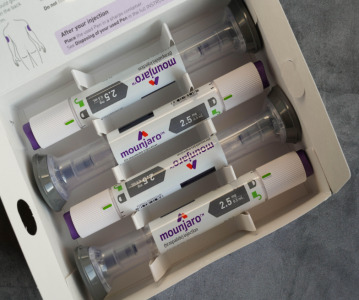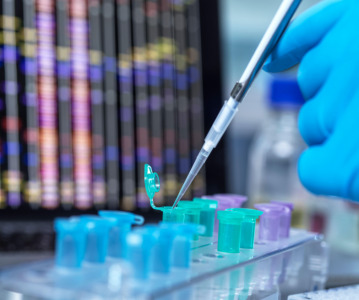Boehringer's investigational anti-CD33 monoclonal antibody gains orphan drug designation for treatment of myelodysplastic syndromes

BI 836858 was previously granted orphan drug designation for the treatment of patients with AML.
FDA has granted orphan drug designation to Boehringer Ingelheim's anti-CD33 monoclonal antibody BI 836858 for the treatment of myelodysplastic syndromes (MDS).
MDS are a group of bone marrow disorders. In MDS, the bone marrow is characterized by cell abnormalities and ineffective blood cell production. Various subtypes of the disease exist with variable prognoses and treatment options. In some cases, MDS can progress to acute myeloid leukemia (AML), an aggressive and devastating blood cancer. According to data from the National Cancer Institute, an estimated 15,000 new cases of MDS are identified each year.
"Preclinical studies with our anti-CD33 monoclonal antibody have shown promising therapeutic potential in myelodysplastic syndromes, a rare group of bone marrow disorders," said Martina Flammer, Vice President, Clinical Development & Medical Affairs Specialty Care, Boehringer Ingelheim. "Orphan drug designation for our investigational candidate in MDS is an important recognition of our ongoing research efforts and underscores Boehringer Ingelheim's commitment to studying treatment options for rare cancers."
A Phase I/II multi-center, open-label, dose escalation and randomized trial (NCT02240706) evaluating BI 836858 in patients with MDS is ongoing. BI 836858 previously received orphan drug designation for the treatment of patients with AML and is currently being evaluated as part of the Leukemia & Lymphoma Society's (LLS) groundbreaking, first-of-its-kind Beat AML Master trial program to advance treatment for patients with AML. Using the latest genomic technology, the trial finds and matches specific AML mutations in newly-diagnosed patients over the age of 60 with an investigational drug or drugs best suited to attack the specific genetic mutations found within the cancer.
BI 836858 is a monoclonal antibody that targets a protein called CD33, which is expressed on the surface of certain cancerous cells. BI 836858 has been engineered for improved antibody-dependent cell-mediated cytotoxicity (ADCC), a type of immune reaction in which a target cell or microbe is coated with antibodies and killed by certain types of white blood cells. Preclinical studies with the compound have shown promising ADCC against malignant cells.
Related News
-
News PSCI Welcomes Delpharm, Samsung Biologics, and Suven as First Supplier Partners
The pharmaceutical industry continues to evolve with an increasing focus on responsible sourcing, sustainability, and collaboration across the supply chain. Under a new model to recognise suppliers within the pharmaceutical and healthcare industry that... -
News Drug prices agreed upon as part of the US Inflation Reduction Act
The Inflation Reduction Act brought into constitution by the Biden administation in 2022, which proposed a drug price negotiation between the government and pharmaceutical companies, has reached it's first agreement. -
News Eisai Alzheimer’s drug authorised in UK but still faces obstacles
In partnership with BioArctic AB, pharmaceutical company Eisai has been granted Marketing Authorisation by the Medicines and Healthcare products Regulatory Agency (MHRA) for its Alzheimer’s disease drug product Leqembi. -
News Eli Lilly's weight loss drugs removed from the FDA's shortage list
The US FDA have recently updated their drug shortage list. The recently released list shows that all dosage forms of Eli Lilly's weight-loss drug Zepbound and their diabetes drug Mounjaro are now available. -
News Global advancements in the diagnosis and treatment of rare diseases: Rare Disease Day 2024
Rare Diseases Day is celebrated on the 29th February 2024 and represents the plight of rare disease patients to gain diagnosis and access to suitable treatment. -
News Pharmaceutical industry supports COP28 health stance in joint statement
As COP28 takes place over this week in Dubai, UAE, several bodies in the pharmaceutical and health industries have come together to announce support of key movements in sustainability in the sector, and to recognise sustainability as a health issue.&nb... -
News Biden backs Cold-War measures to shore-up medical supply chains
In a recent strategy to combat rising inflation and the cost of living crisis, President Joe Biden has invoked a Cold War-era act to increase investment in a selection of medicines and supplies. -
News CPHI Podcast Series: What does the changing US Pharma market mean for industry and patients alike?
In this week's episode of the CPHI Podcast Series Lucy Chard, Digital Editor for CPHI Online is joined by James Manser to discuss the political and market changes in the US pharma field.
Position your company at the heart of the global Pharma industry with a CPHI Online membership
-
Your products and solutions visible to thousands of visitors within the largest Pharma marketplace
-
Generate high-quality, engaged leads for your business, all year round
-
Promote your business as the industry’s thought-leader by hosting your reports, brochures and videos within your profile
-
Your company’s profile boosted at all participating CPHI events
-
An easy-to-use platform with a detailed dashboard showing your leads and performance


.png)




